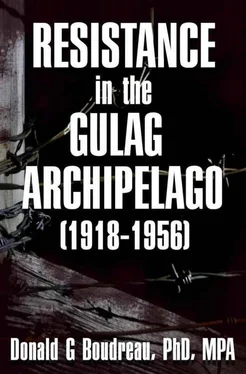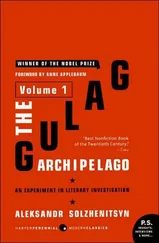Donald Boudreau - Resistance in the Gulag Archipelago
Здесь есть возможность читать онлайн «Donald Boudreau - Resistance in the Gulag Archipelago» весь текст электронной книги совершенно бесплатно (целиком полную версию без сокращений). В некоторых случаях можно слушать аудио, скачать через торрент в формате fb2 и присутствует краткое содержание. Год выпуска: 2012, Жанр: История, на английском языке. Описание произведения, (предисловие) а так же отзывы посетителей доступны на портале библиотеки ЛибКат.
- Название:Resistance in the Gulag Archipelago
- Автор:
- Жанр:
- Год:2012
- ISBN:нет данных
- Рейтинг книги:4 / 5. Голосов: 1
-
Избранное:Добавить в избранное
- Отзывы:
-
Ваша оценка:
Resistance in the Gulag Archipelago: краткое содержание, описание и аннотация
Предлагаем к чтению аннотацию, описание, краткое содержание или предисловие (зависит от того, что написал сам автор книги «Resistance in the Gulag Archipelago»). Если вы не нашли необходимую информацию о книге — напишите в комментариях, мы постараемся отыскать её.
The writer and Soviet dissident Alexander Solzhenitsyn (1918–2008), winner of the 1970 Nobel Prize in Literature, introduced the term Gulag to the Western world with the 1973 publication of his The Gulag Archipelago. The book likened the scattered prison camps to a “chain of islands” and depicted the Gulag as a system where people were essentially worked to death. In March 1940, for example, there were 53 separate camps and 423 labor colonies in the USSR. This essay attempts to glean the manifestations which occurred within the Gulag that can be characterized as inmates resisting, dissenting, and otherwise engaging in protesting-like activities. This objective is carried out by examining resistance in the Gulag archipelago through addressing the relevant portions of historical written works, including among other sources, Soviet historian Roy A. Medvedev’s
(1972), Robert Goldston’s
(1966), two of Solzhenitsyn’s finest novels,
(1972) and
(1972), and of course, through our primary source, Solzhenitsyn’s
(1973).
While written in 1974 as the author’s senior thesis as a Political Science major college undergraduate, some might question the dated nature of this essay given the collapse of the Soviet Union in 1991, and other subsequent reforms that have since taken place in Russia. But such would be short term focused and misguided, in the sense that the subject remains useful given that contemporary Russia, the former Soviet Union has, in many ways, failed to come to grips with the Stalinist era in Soviet history and its resultant tragic legacy and thus, Stalin’s infamously true reputation as a tyrannical leader and mass murderer of his own people. As David Satter (2011) powerfully observes in
(Yale University Press) the elemental failing of Russia’s leaders and people is their refusal in facing the moral depravity of its Soviet past, including its most savage manifestation: Joseph Stalin’s terror.
In addition to containing its original selected bibliography, prepared in 1974, this essay has been improved upon by adding a new, post-1974 era bibliography, reflecting some of the relevant subsequent developments and their related writings regarding the Gulag camps, Stalinist Russia, and surely, Alexander Solzhenitsyn and his related literary works.












